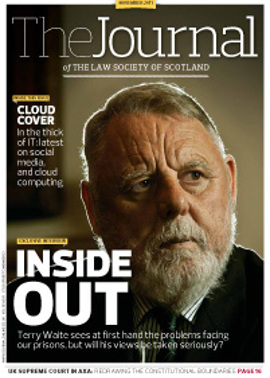ILG takes on risk
In-house lawyers were challenged to consider where they are going, during their annual general meeting and conference in Edinburgh on 28 October.
ILG chairman Janet Hood, in her address to the AGM, warned of the changes taking place in the legal sector, including the effect of alternative business structures (ABS). That could impact, she said, on the in-house sector as different organisations increasingly questioned whether they should continue to pay practising certificate fees.
“The indications are that people may not realise what their in-house team does for them”, she added, calling on in-house lawyers – as she has done before – to “get yourselves known across your organisations”: that is, make a point of ensuring different departments know who you are and what you do.
She also pointed out that ILG members could themselves restructure their services, as for example the Glasgow Housing Association legal team had already done.
The ILG has been undergoing a review of its position within the Society; a report has just been received by the chairman and vice chairman and will shortly be made available for members to comment on. Hood appealed for members to do so, “to help us be within the framework of a modern Law Society”.
The business of risk
The main theme of the conference was risk and compliance. With seven major firms now sponsoring the conference, there was much in-depth advice on best practice, as each took a slot.
John Schmidt of Shepherd and Wedderburn opened with “Managing Corporate Government and Regulatory Risk”, highlighting the ubiquity of risk and enforcement in an increasingly complex regulatory environment. He advocated an approach focusing on the likelihood of an event occurring, along with the severity of impact if it did, in identifying those with whom one should seek to collaborate, as well as the implications for training and compliance.
Kathryn Wynn of Pinsent Masons followed with a case study of the Sony PlayStation data breach involving the personal details of 77 million users. This highlighted the importance of data security, and the damage to the brand and loss of confidence in security especially of an online system, should a breach occur – and the importance of handling the response effectively.
DLA Piper’s Philippa Montgomerie and Katherine Stocker then took the podium, discussing the increasing demand from clients for control and management of legal costs, and the importance of transparency and clarity of information in working with clients to set budgets and fee structures. Their firm now sets out quite detailed budgeting forecasts to enable clients to plan.
Employment law was the subject for David Morgan of Burness, particularly the way advisory work is moving away from “firefighting” towards risk management – working with the HR team to anticipate circumstances that would give rise to a risk of a claim, and discussing how the risk can be minimised.
One to follow up
After lunch, Dundas & Wilson and Brodies led the two streamed sessions, one covering the commercial and one the public sector. The former discussed changing law firm-client relationships, with a business client on hand to share the presentation, covering how clients are looking for more cost-effective offerings, including alternative sourcing of lower level work. The level of interest had Janet Hood proposing a further ILG forum to follow up. We followed up with issues arising in contract drafting and disputes. The public sector session covered different models for delivering shared services, and compliance and VAT issues arising; and then the pros and cons of taking disputes to litigation, arbitration or mediation.
The day was rounded off by Tom Stocker and James Cran of McGrigors taking us through internal investigations and reports – illustrating with case studies the circumstances in which investigation might be required, and the alternative ways of taking action, covering of course the potential risks associated with each.
Space unfortunately does not permit fuller coverage of what was indeed a very worthwhile day, but we hope to bring you further discussion of at least some of these topics in the coming months.
We conclude meantime with a mention of Austin Lafferty’s vice presidential address, in which he too warned of the changes taking place in the market at all levels of the profession, and the need for all members to help the Society’s work to get the Government and the public to understand solicitors’ professionalism, expertise and honesty.
Recalling a line from his favourite film, It’s a Wonderful Life, he said: “We must hold together, stick together, and we will survive.”
In this issue
- The role for pro bono
- Rectifying trusts – a Scottish perspective
- Squeezing capital claims
- The many faces of mortgage fraud
- Welcome break or cause for concern?
- Opinion
- Reading for pleasure
- Book reviews
- Council profile
- President's column
- Beware what you register
- Justice inside and out
- Auto-enrolment: are you prepared?
- Power and authority
- Refining the message
- Seeing through the cloud
- Don't drag out child cases
- Up to the job?
- Permanence changes
- LGPS: sea change again
- Scottish Solicitors' Discipline Tribunal
- ILG takes on risk
- Real burdens revived
- Practical limitations
- CPD: how to comply
- Law reform update
- The learning curve
- Ask Ash
- Inside story






